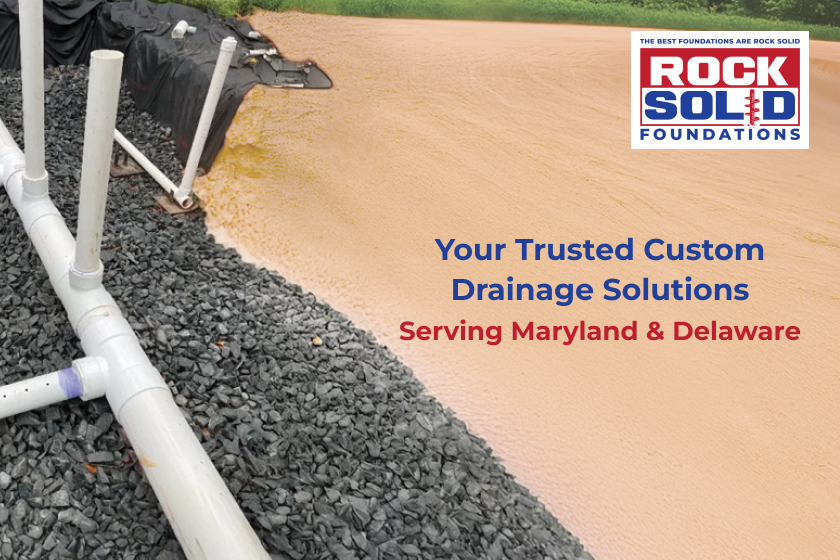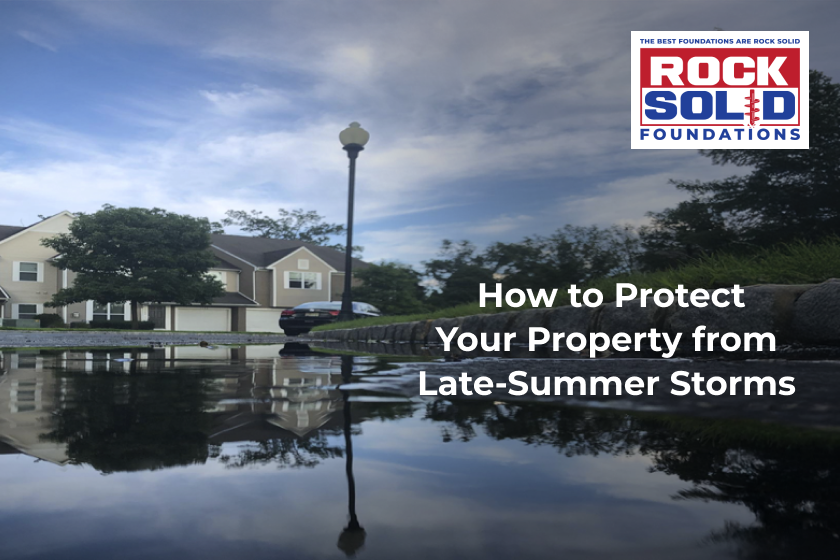Late-summer storms are often the most unpredictable. One moment it’s sunny and warm, and the next, your backyard is a shallow lake. If your property isn’t equipped with proper drainage solutions, these seasonal downpours can lead to serious damage, not just outdoors, but also inside your home.
In fact, 1 in 50 homeowners in the U.S. files a water damage claim each year.*
So, why does drainage matter so much? Let’s explore the importance of effective drainage, the most common systems in use today, and how choosing the right drainage contractor can help protect your property from costly storm-related damage.
Why Are Late-Summer Storms a Risk?
By late summer, the soil in many regions is already saturated from earlier rains. Combine that with high humidity and sudden thunderstorms, and you’ve got the perfect conditions for flash floods, basement seepage, and water damage.
Poor drainage can lead to:
- Water pooling near foundations
- Soil erosion around your home
- Basement leaks or flooding
- Mold growth from moisture buildup
- Structural damage over time
What starts as a puddle can become a persistent headache if left unaddressed.
What Do Effective Drainage Solutions Include?
Drainage solutions are not one-size-fits-all. A reliable drainage system is designed based on your property’s grading, soil type, and existing structures. Here are a few systems that homeowners and contractors commonly rely on:
1. French Drains
These are gravel-filled trenches that redirect water away from your home using a perforated pipe. French drains are especially useful for homes with poor surface grading or frequent water buildup in the yard.
2. Surface Drains and Catch Basins
These systems are placed in areas where water collects and help direct runoff into underground drainage pipes. They’re a must-have for driveways, patios, or near walkways.
3. Downspout Extensions
Gutters are only half the job. If the downspouts dump water next to your foundation, you’re still at risk. Extensions carry water several feet away from your home, where it can drain safely.
4. Grading and Sloping
Sometimes, the best solution is to reshape the landscape itself. A drainage contractor may recommend regrading your lawn or garden to slope gently away from your house.
5. Dry Wells or Soakaway Pits
These underground systems allow excess water to percolate slowly back into the soil. They’re eco-friendly and help reduce the strain on municipal drainage systems.
Warning Signs You Need Better Drainage
You may not always see flowing water to know there’s a problem. Here are a few subtle (and not-so-subtle) signs that your property needs updated drainage solutions.
- Puddles that don’t go away even after a day or two
- Muddy, soft patches in your lawn
- Water stains on the basement walls or floors
- Cracks in the foundation
- Gutters that overflow despite being clean
If you spot any of these, it’s time to talk to a professional drainage contractor.
How a Drainage Contractor Helps
Hiring a drainage contractor isn’t just about digging trenches; it’s about ensuring the job is done correctly and to the highest standards. It’s about getting expert guidance on what works for your specific property layout.
A qualified contractor will
- Inspect your site and identify areas of risk.
- Recommend the most cost-effective and long-term drainage solutions.
- Handle permits and ensure everything meets local building codes.
- Use proper materials and equipment for installation.
- Help with seasonal maintenance or upgrades.
Choosing a skilled contractor is crucial to ensuring your home remains dry and damage-free during unpredictable weather conditions.
Don’t Wait for the Next Storm
One of the most common mistakes homeowners make is waiting too long to make a decision. Drainage problems rarely resolve themselves, and a short delay can double the cost of repair if water damage occurs.
Late summer is the ideal time to take action. A well-installed drainage system can now keep you protected through fall rains and winter snowmelt.
Why Proper Drainage Is a Long-Term Investment
Good drainage doesn’t just prevent damage; it adds value to your property. Homes with reliable drainage systems are more appealing to buyers, and you’ll spend less on repairs, mold treatments, or foundation restoration down the line. It’s peace of mind that pays off.
We Keep Your Property Dry and Storm-Ready

At Rock Solid Foundations, we specialize in providing custom drainage solutions that work for both residential and commercial properties. With over 30 years of combined experience, we understand how to protect your home from the unpredictable weather in Maryland and Delaware, including Montgomery County, Anne Arundel County, and the Eastern Shore.
We provide:
- Site inspections and drainage assessments
- Installation of French drains, grading, dry wells, and more
- Excavation and waterproofing support
- Seasonal maintenance and upgrades
As a veteran-owned company, we’re committed to quality, precision, and service that stands the test of time. We understand how to protect your home from unpredictable weather.
Reach out to us for a free estimate, and let’s ensure your property stays safe and dry, no matter what the weather brings.
*Source: https://shaferinsurance.com/american-homeowners-increasingly-filing-more-water-damage-claims/
Frequently Asked Questions
1. How do I know if my yard has poor drainage?
If water pools for more than 48 hours after rain, or you see soggy patches in dry weather, your yard likely has drainage issues.
2. Can drainage solutions also help prevent foundation damage?
Yes. Directing water away from your home reduces pressure on the foundation and helps prevent cracks and leaks.
3. Are drainage systems high maintenance?
Most systems require minimal upkeep, like clearing debris from grates or checking for clogs in pipes once or twice a year.
4. Will my landscape be affected during drainage installation?
Although there may be a temporary disruption, a professional drainage contractor will minimize the impact and restore your landscape after the installation is complete.
5. Do I need a permit to install a drainage system?
In many areas, yes. A licensed contractor can handle the permitting process on your behalf.
6. Can I install a drainage system myself?
Basic fixes, such as downspout extensions, may be DIY-friendly, but for larger issues, hiring a drainage contractor ensures safety, compliance, and long-term results.

